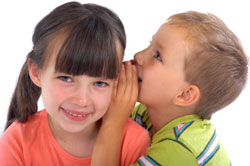 Up to the age of 10 or so most children are very concrete thinkers – they have not developed the ability to see gray areas or to think abstractly. An example might be that it is difficult for them to understand the difference of when to keep a secret or to tell others what they have been told.
Up to the age of 10 or so most children are very concrete thinkers – they have not developed the ability to see gray areas or to think abstractly. An example might be that it is difficult for them to understand the difference of when to keep a secret or to tell others what they have been told.
When we are teaching them about trustworthiness or or even loyalty we want them to know that their are times when they should keep a secret they have been told, like when we tell them or they find out about a surprise birthday party for a friend or their dad. We also want them to know when it is necessary for them to tell a “secret”, when they should tell an adult what they know, like when a friend is being mean to someone or they have lied about an event.
How can we help them differentiate between the two? When should they tell and when should they keep the secret? Here is a question they can ask themselves to check in on how to make that decision.
If a secret can hurt you or someone else, you should tell an adult.
This simple testing statement can help keep them safe and develop other great gifts of character. Loyalty, honesty, trust, friendliness, fairness, fidelity, integrity, responsibility can all be tied into this simple check that even very young children can make.
